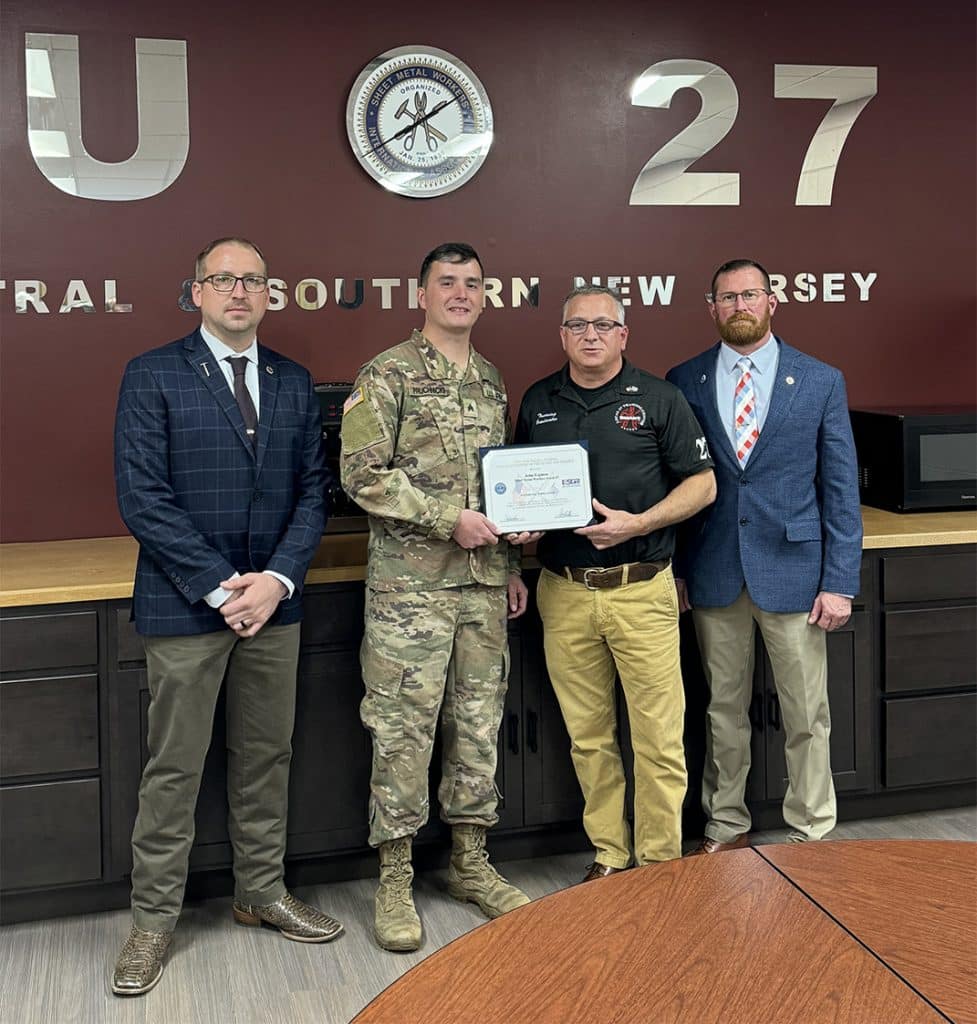Note: This article was originally published by Eye On Sheet Metal, a resource for the unionized sheet metal industry.

John Espinos has mentored many apprentices in his time as training coordinator at SMART Local 27 in central and southern New Jersey, but receiving a Patriot Award for going above and beyond in his support of a servicemember took him by surprise.
“I was not expecting this at all,” Espinos said. “It actually brought a tear to my eye.”
The award pin and certificate were presented to Espinos by Ronni Enzman, Monmouth County chairperson for the Employer Support of the Guard and Reserve (ESGR), at a small ceremony at the training center on November 27.
Sgt. Mike Pruchnicki, currently in the second year of his apprenticeship, is the servicemember who nominated Espinos. He recalled all the extra time Espinos took with him to help get his Veterans Affairs (VA) benefits in place and, later, to make his deployment as smooth as possible.
“John helped me a lot since I came to Local 27 … he supported me each time I went away on orders or training, and ensured I still would have work when I returned,” Pruchnicki said. “He has been very supportive through everything, and when I found out about the Patriot Award, I couldn’t think of anyone else more deserving than John.”
The Patriot Award is one in a series of Department of Defense awards granted by the ESGR, and it reflects efforts made to support servicemembers through a wide range of measures including flexible schedules, time off prior to and after deployment, caring for families and granting leaves of absence when needed. Servicemembers can nominate a supervisor they feel has made a substantial difference for them.
“This is yet another way to show the sheet metal industry is employing veterans, and veterans appreciate the support they are given,” said Josh Moore, International Training Institute field representative and SMART Heroes specialist. “This young man was worried about his apprenticeship, and he was glad John was there to support him. I think it’s great that the local is being recognized. They’re the ones that support the apprentices as they make their transition into journey work.”
Moore and Espinos believe this is the first time a training coordinator for a SMART local has received a Patriot Award. The ESGR awards program is progressive, with the Patriot Award serving as a first step toward further recognition. In order to qualify for consideration for higher honors, such as the Above and Beyond Award or the program’s highest recognition, the Secretary of Defense Employer Support Freedom Award, an employer must first have at least one supervisor recognized with a Patriot Award.
Espinos is no stranger to recognition as a mentor — or lapel pins of appreciation. He’s been involved in Boy Scouts of America as a scoutmaster for many years, and over time he accumulated quite a few mentor pins from Eagle Scouts who wished to honor those who had helped them on their journey. It got to the point, he said, that at Boy Scouts events he would jokingly walk lop-sided and say all the pins were weighing him down. Memories of those events came back to him as he received the Patriot Award.
“It reminded me of something my dad said before he passed,” recalled Espinos. “He told me, ‘You were a rough kid growing up, always in trouble, but I knew you were here to make an impact on other people’s lives.’”
The difference Espinos made for Pruchnicki was evident when Espinos received his award, but this is far from the first or last time a training coordinator will go to bat for an active-duty guard or reserve member. They step in to coordinate solutions when a contractor must lose a valued apprentice due to deployment, then make sure that servicemember’s job is safe and waiting for them when they return. Training coordinators at sheet metal locals also often help apprentices with VA matters and paperwork or online forms for the GI Bill, as well as making sure the apprentice gets hours covered to receive health care, pension and everything else that should be available to them.
Espinos said that there are quite a few hoops to jump through, but once you go through it the first time, it gets easier each time afterward. He also noted that apprentices at Local 27 are really in full-time classes for only around four weeks a year, each year of the five-year program.
“In that short amount of time, it felt good to make an impact on [Pruchnicki’s] life,” Espinos said.